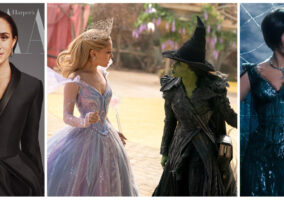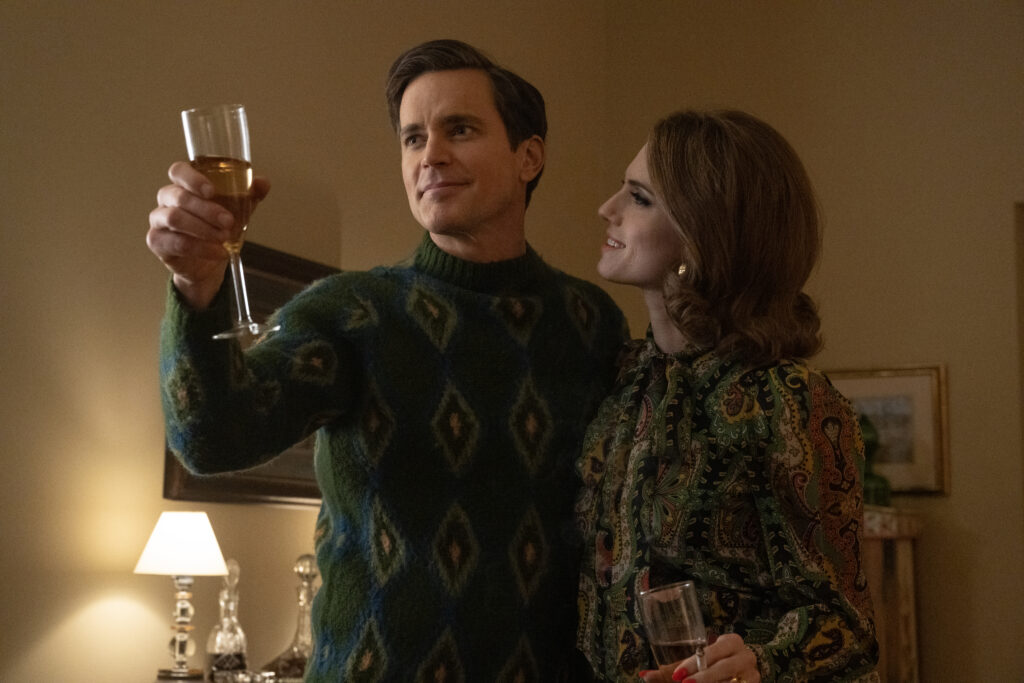
Hawk is working the bars, asking around about Leonard Smith, who’s frequenting the local tea room. A bouncer warns Hawk that there are a lot of crackdowns happening. At the Cozy Corner, Marcus and Frankie are getting, well, cozy when the cops raid the bar. Marcus flees and leaves Storme and Frankie behind. Leonard gets arrested at the tea room. Hawk manages to get Leonard out of jail and his cop-on-the-make friend says he’ll try to get the arrest record buried. Hawk asks Leonard if he realizes how much it will cost to get the arrest record buried and Leonard sneers that it’s not his money, it’s his father’s. Hawk vows that Senator Smith will never hear about this.
Tim is waiting for Hawk in bed and asks him what took him so long to get back to him. Hawk smoothly lies about the situation, not trusting Tim to keep the news of Senator Smith’s queer son away from McCarthy and Cohn; not because he’s untrustworthy, but because he’s a terrible liar. Hawk is extremely cuddly and affectionate with him, which Tim notes as unusual.
At the McCarthy hearings, McCarthy, Cohn and Schine are roundly mocked by the Army’s counsel and the other senators who make repeated implications and slung innuendo. Schine is furious with Cohn for putting him in a humilaiting situation. Schine points to a picture of the Secretary of the Army posing with him as proof of his military bona fides, but Roy reveals he asked the Secretary to pose with him. That doesn’t stop Roy from offering a doctored version of the picture to the committee; one which Tim immediately notices is doctored and blurts out to Marcus.
Senator Smith reveals to Lucy and Hawk that two McCarthy allies told him about Leonard’s arrest and threatened to reveal it if he didn’t resign. Smith waves it off as rumor and nonsense. Hawk asks Lucy to leave the room and she sharply refuses to do so. He tells the Senator the truth about his son and advises him to let the McCarthy camp know that he’ll back off the Senator and vote against expulsion in order to give Hawk enough time to have any evidence destroyed. He also promises to look into “places that help men like” Leonard. Smith says he’s disgusted by it all, but Hawk says that Leonard is “just one of nature’s mistakes.”
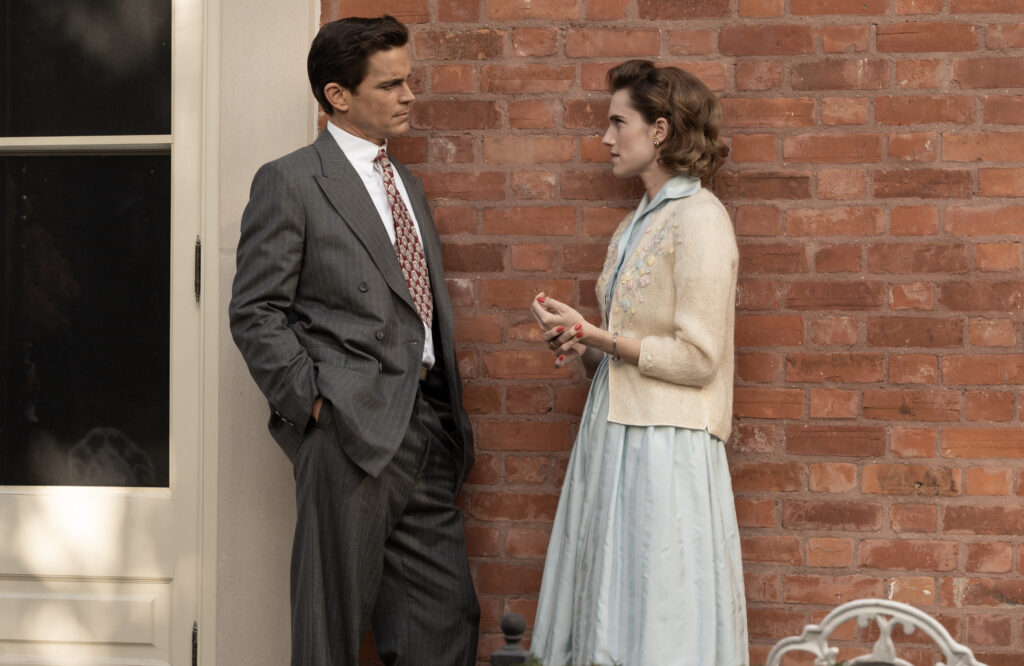
Outside, Lucy tells Hawk a story of meeting two male “traveling companions” in Europe, reacting with shock at a moment of affection between them, and seeing the look of shame on their faces. “I’ve seen that look before,” she tells Hawk, then after a beat, “on Leonard’s face.” It’s barely perceptible but you can see the relief on his part that she didn’t say it was his face. He kisses her as hard as he can.
Cohn accosts Tim in the men’s room, needles him about a supposed Smith donor getting him the job in McCarthy’s office, and tells him that he heard Smith’s son is a faggot. Tim is surprised by the news, but Cohn doesn’t believe him. When Tim attempts to explain that the package he handed David Schine was just sitting on his desk and he didn’t know where it came from, Cohn rightly points out what a bad liar he is. Once again, we have to point out that Tim’s loyalty to these people is seriously under-examined in this story, not just by the narrative, but by any of the other characters. Why do Marcus and Hawk treat him like this naive innocent when he’s loyal to a man they both consider to be evil? Tim breaks the rules by going to Hawk’s office (where he has a new secretary after that sour-faced commie-hunter tried to out him) and demands to know what was in the envelope. Surprisingly, Hawk tells him the entire truth and berates him for not providing a good enough cover story. “I guess I don’t lie as easily as you do,” says the guy working for McCarthy and Cohn more than a little self-righteously. “Then you won’t survive,” Hawk responds acccurately. Tim notes that it’s funny how Cohn said almost the exact same thing to him. We still don’t know where he gets off being smug. Don’t get us wrong, Hawk is a nightmare boyfriend and a bit of a sociopath, but Tim getting pissy about Hawk’s dishonesty is wearing a little thin considering the people he works for.
Frankie and Marcus meet in the park like two spies, sitting ramrod straight, facing forward, hands on their knees, while they bare their souls to each other, unable to be even slightly intimate or affectionate in public. Marcus reveals that he’s done living any kind of gay life; no socializing, no relationships. Frankie shows him the manicure he got and notes how he only opted for a gloss knowing he’d be meeting the skittish Marcus in public.
Leonard Smith is packed up and shipped off to an institution. His goodbyes are bitter and pretty much unrepentant. He’s resigned to his status as a “disgusting thing,” which ironically gives him much more freedom to be honest than the closet affords Hawk, Tim, Marcus or Roy Cohn. When Lucy sniffily informs him that she doesn’t tell lies, he counters that she does it all the time without know it. When the Senator tries to buck him up and tell him that whatever inhuman treatment he’s about to suffer will be good for him, Leonard sneers and blames his state on his father for rejecting him as a son in favor of Hawk. No one argues with this assessment, although the Senator weirdly turns on Hawk and blames him for it. At the hospital, Hawk coolly sits and listens to the doctor talk about his theories on homosexuality. “So they think they’re normal men, like us?” he asks him. On the one hand, we think Hawk is silently mocking the guy, but on the other hand, he doesn’t bat an eye when he hears how Leonard will be treated it with shock therapy. He insists that Leonard not be allowed to receive any visitors or take any phone calls. He more or less sent his brother to solitary confinement in order to keep him from saying anything to the press. Leonard mentions a time when they were kids and jerked off together and how he considered telling his father the truth about Hawk. We were wondering if he even knew, to be honest. Hawk, ever the sociopath, dares him to tell his “sick fantasy” to his father, because he’ll never believe him. Leonard agrees and admits he wants to be “free of this thing.”
Senator McCarthy helpfully explains to his angry wife that sometimes men need the companionship of other men. “What does he have on you?” she demands to know about Cohn. “Men from Wisconsin don’t turn on their friends,” he replies, to which she makes the somewhat nonsensical retort that men from Wisconsin know how to get their wives pregnant. Tim chooses this moment to tell McCarthy about the doctored photograph and the senator damn near chokes him in response. Tim finally has his awakening and writes a letter to Mr. Welch, the army’s lawyer, telling him the truth before walking out of that life apparently forever. At the next hearing, Welch reveals the undoctored picture. McCarthy tries to get into word games with him and Welch winds up calling him a fairy, more or less. Mrs. McCarthy storms out. Later, so does David Schine, making sure to mention on the way out that he’s normal, unlike Roy.
At the Post, Marcus is routinely subjected to racist jokes and commentary, but he presses past all of it to ask for post on the senate beat. His editor waves him off and tells him to be patient. “You know what they say, real change comes slowly.” The only people who say this are the people who don’t want real change, or as Marcus notes in his response, white people. He goes to use the whites-only restroom and pisses on his co-worker’s feet. Consider that bridge well and truly burned.
A drunk and desperate Tim confronts Hawk outside his apartment building, needing some sort of connection after having cut himself off from his own long-held beliefs. “I should have left you alone,” Hawk says accurately. He reveals that he’s going to ask Lucy to marry him. Tim leaves in tears. Meanwhile Senator Smith sits Lucy down in the middle of the night for a little “I’m about to kill myself” conversation that flies right over her head. McCarthy’s allies have threatened to release the information about Leonard if Smith doesn’t resign. “You and Hawk will be fine,” he assures her. “We’ll all be fine,” she answers somewhat delusionally. The next morning, Smith goes to his office, writes a letter about truth and freedom, and puts a gun in his mouth, ending his life as yet another example of how homophobia claims collateral damage that’s as devastating to friends, family and allies as it is to queer people. In related news, Tim enlists in the army, the poor thing. At this point, we have to admit that the story, as captivating as it is, drags quite a bit. It would be helpful if it weren’t entirely focused on two years in a 35-year stretch.
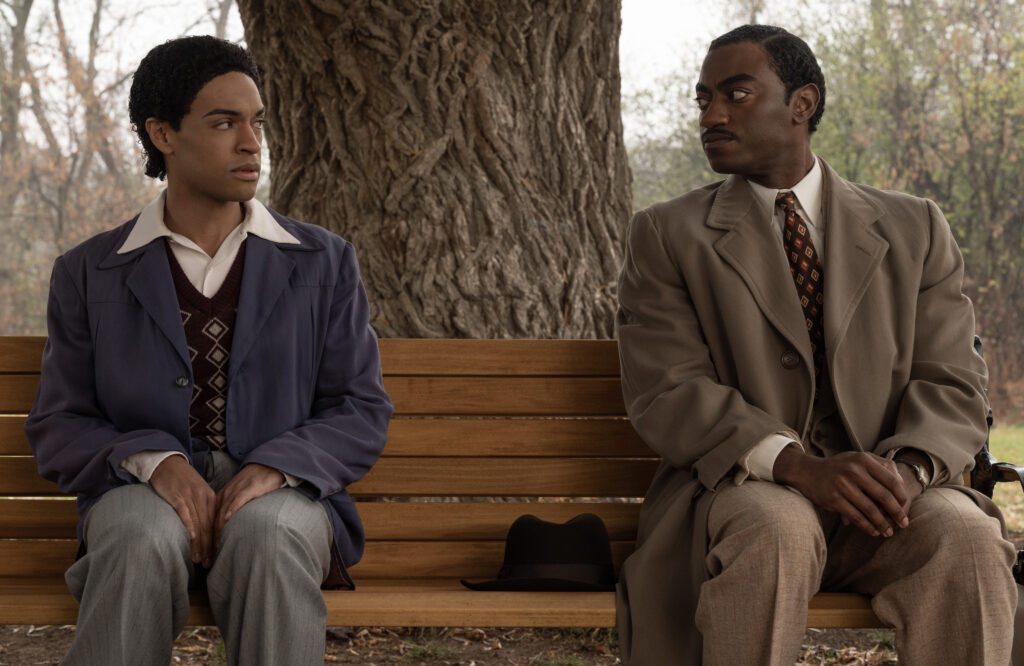
A newly invigorated Marcus, fresh from pissing on white people, meets Frankie in the park and tells him he wants to write about “things that matter” for a new magazine called Jet. Frankie, sporting bright red nail polish, tells him that he’s going on the road with Storme with the Jewel Box Revue, a traveling drag revue that has become famous in the decades since for being one of the largest employers of queer people at the time, as well as having exposed countless clueless straight patrons (who were the Revue’s main audience) to queer culture. Frankie tells him that he wants to establish a real home with someone when he gets back. Hawk and Tim enjoy one final romantic night together, looking out over Washington. “I have to get over you,” Tim says. “Yeah, you do.”
And just like that, it’s 1968. As much as we welcomed the shift away from the show’s established formula and setting, it almost felt like it came too late. A conventional linear narrative would have sacrificed a lot of what drives the story now, but there are times when it feels like the series suffers from a pacing issue. If nothing else, the sudden elimination of the whole McCarthy story felt like a giant hole in the series. We’ve spent five hours of the show exclusively focused on one year in the early ’50s and several weeks in the late ’80s. It’s jarring to suddenly discover that Tim joined the army and the seminary in the years since the last episode. Leonard Smith’s fate is completely obscured and Hawk and Lucy have a previously unmentioned son. We realize that discovering the twists and turns of each person’s life over the years is part of the point of the timeline jumps, but after five hours of story, we shouldn’t feel this disconnected from it. Having said all of that, it was interesting to see where everyone wound up or didn’t wind up in the 15 years since Hawk and Tim parted. Tim, evidently having completed his army tour some time ago, is now a radical Catholic seminarian committing acts of civil disobedience in protest of the Vietnam war. The extremes at which he lives his life, the clearly intense need for some sense of belonging, some honest sense of his place in the world, while still – STILL – trying to live in denial of his true self is sad to watch. He has become a tragic figure.
To be fair, it’s not as if Hawk’s life is anything to aspire to, even though he and Lucy are living the textbook upper middle class aspirational lifestyle. But the marriage is cold, Hawk is still telling as many lies as ever, and his family is unraveling. His son (and presumably the loss Tim alluded to earlier) Jackson is depressed, angry and acting out because he clearly understands who his father really is. We learn through a series of conversations and scenes that Hawk held on to his apartment for some time after the wedding and then traded it in for a cabin in the woods. It’s more than clear why – not just to us, but to half his family. While Tim has been trying to suppress his urges for men, Hawk never stopped indulging his. But you can’t live that kind of life while living with a wife and children and trying to keep all of it a secret from them without issues arising and sacrifices being made. There’s a reason Hawk rarely let anyone into his old apartment when he was single. His life of constantly pursuing sex and trying to hide it simply can’t be conducted in a family living situation without having some effect on the health of the family. And if we haven’t said it before, this is where Matt Bomer’s casting really comes into play. A gay man of Hawk’s generation who looked like Matt Bomer and tried to live his life on the down low would be damn near addicted to random anonymous sexual encounters because they would be instantly available to him at the drop of a hat. He is, in many ways, a victim of his own good looks and ability to lie.
Although perhaps it would be more accurate to note how much everyone else is a victim of Hawk’s choices. This episode lifted the veil on Lucy, making clear that which was only alluded to in previous episodes: she knows about Hawk and she has since the very earliest days of their marriage. We admit to feeling a little uncomfortable with Lucy’s story. There are so many tales of wives living sad and stressful lives at the mercy of their gay husbands’ urges. There’s real value in giving a character like Lucy some spotlight time, but she’s being positioned as a woman who not only suffered through a marriage to a gay man, but had a gay brother institutionalized, a father who died by suicide over it, and the story is heavily suggesting that she lost a son to suicide as well, possibly because he was conflicted over his father’s lying. We get and support the idea that homophobia damages all of society, but this is just way too much gay-related misery to pile on one straight woman.
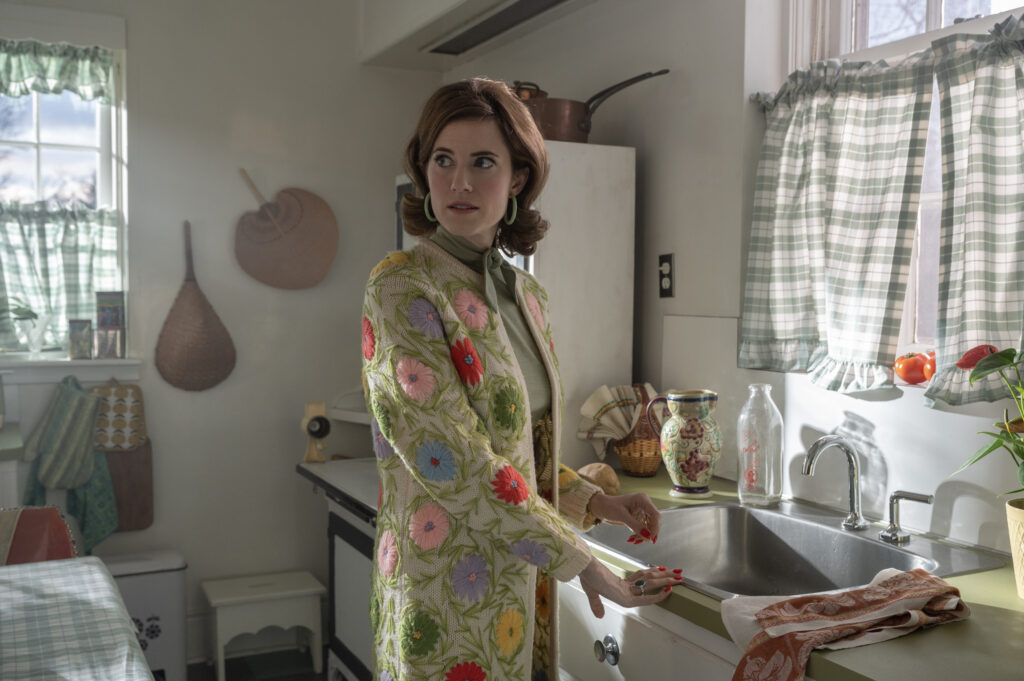
Anyway, after raiding a draft office and burning a pile of draft cards, Tim and his cohorts wind up fleeing the law. Some of them don’t make it. Hawk, having seen Tim’s picture at the protest in the paper, calls Marcus to arrange to have Tim hide out in his cabin. Marcus is living with his ailing father and it’s genuinely disappointing to see that he and Frankie are not together at this time. One of the pleasant surprises of the earlier episodes was the discovery that they were still together 35 years after the Cozy Corner. Given how relentlessly tragic Tim’s and Hawk’s lives have become, it provided a nice sense of balance to have a satisfying queer love story. Right now, they’re just another couple of wounded gays in a story with too many of them. Despite what the story might suggest, queer people of this time were capable of forging bonds and, if the bonds weren’t permanent, moving on and forging new ones. We weren’t all tragically pining away for distant lovers for decades at a time.
Speaking of which, Hawk puts Tim up in his cabin and doesn’t attempt to change the situation even when his family shows up to spend the weekend at the main house. He’s so wrapped up in himself (and so clearly thrilled to see Tim again) that he immediately pushes him for sex. He winds up jerking off with him and then getting treated to the full force of his self-loathing. The hotness of their earlier sex replaced now by this desperate, furtive, shame-filled thing. Eventually, Lucy and Tim come face to face, as we all knew they would at some point. He is mortified to have his own “sin” exposed and she is more than a little revolted by the frantic criminal in her home. Before he leaves, she tells him that she burned the letter he wrote to Hawk all those years before. “He never saw it.” In a weird way, this felt as much like penance as it did vindictiveness. She clearly wanted to hurt Tim in that moment, but we got the sense she also understood how heartbroken a figure he us and tried to offer an explanation for her part in it. Hawk tries to reconcile with his angry, depressed son, who tries to tell his father just how much he’s hurting, but Hawk hasn’t learned a single lesson in all of these years, so instead he downplays his own son’s pain and tries to heal him with a hug. ‘We’re all going to be fine,” he says, echoing Lucy’s words to her father the night before he killed himself. This tragic family is about to get even more tragic.
Friday Leftovers for the Week of November 26th, 2023 Next Post:
THE GILDED AGE S2E6: “Warning Shots”
Please review our Community Guidelines before posting a comment. Thank you!

